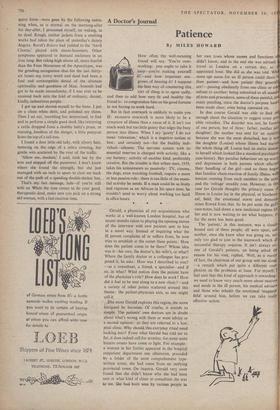A Doctor's Journal
Patience
By MILES HOWARD But in fact overwork is unlikely to make you ill: excessive overwork is more likely to be a symptom of illness than a cause of it. It isn't too much work but too little gaiety that edges the busy person into illness. When I say 'gaiety' I do not mean 'relaxation,' which is a negative notion at best: and certainly not—for the healthy indi- vidual—idleness. The nervous system with its essential reserves is charged with activity, like a car battery ; activity of another kind, preferably creative. But the trouble is that urban man, 1959, takes his amusements so passively: TV, cinema, the dogs, even watching football, require a more or less passive role: there is too little of the essen- tial activity he needs. If a man could be as lively and vigorous as an African in his spare time, he wouldn't need to worry about working too hard in office hours.
• _ • * Gerald, a physician of my acquaintance who works at a well-known London hospital, has of recent months taken to playing the opening moves of the interview with new patients sent to him in a novel way. Instead of inquiring what the ill person complains of or suffers from, he now tries to establish at the outset these points : How does the patient come to be there? Whose idea was it—his own, the doctor's, his wife's, or what?
Where the family doctor or a colleague has pro- posed it, he asks : How was I described to you?
—as a consultant, a friend, a specialist—and if so, in what? What notion does the patient have of the physician's role? How does he work? How did it feel to be sent along to a new clinic?—and a variety of other points scattered around this theme: the patient-physician axis, as one might call it.
The more Gerald explores this region, the more intrigued he becomes. Of cour'se, it sounds so simple. The patients' own doctors are in doubt about what's wrong with them or want advice or a second opinion : so they are referred to a hos- pital clinic. Why should this everyday ritual need looking into? From what Gerald has told me so far, it does indeed call for scrutiny, for some quite bizarre events have come to light. For example : a woman in her forties appeared in the hospital outpatient department one afternoon, preceded by a folder of the most comprehensive type- written notes; she had come from an outlying provincial town. On inquiry, Gerald very soon found that she didn't know why she had been sent or what kind of clinic or consultant she was to see. She had been seen by various people in her own town .whose names and functions s didn't know; and in the end she was advised travel to London on a certain day, at appointed hour. She did as she was told. W more apt name for an ill person could there than patient—and how patient they general' are!—passing obediently from one clinic or con sultant to another; being submitted to all mantle of tests and procedures, some of them painful, an many puzzling, since the doctor's purpose hasp been made clear; even being operated on.
In due course Gerald was able to find 0. enough about the situation to suggest some p sible remedies. The disorder was not, he found of one person, but of three : father, mother an daughter; the mother was sent for an opinion because she was the most disturbed, but it w the daughter (Louise) whose illness had started the whole thing off. Louise had an entire dossier to herself which looked like a standard psychiatric case-history. Her peculiar behaviour set up worrY and depression in both parents which affected their handling of the girl—and so. there began that familiar chain-reaction of family illness, with tension running from each member to the neXt, and the 'voltage' steadily rose. However, in this case (so Gerald thought) the primary cause of illness in Louise lay in the physical, or biochernt' cal, field; the emotional storm and domestic crises flowed from that. So he put aside the girl's case-notes, laid down a new medicinal regime for her and is now waiting to see what happens; sd far the news has been good.
The 'patient,' in this instance, was a close/Y bound unit of three people; all were upset, and mother, once she knew what was going on, was only too glad to join in the teamwork which 30 successful therapy requires. It isn't always so: one of Gerald's patients, on being asked the reason for his visit, replied, 'Well, as a matter of fact, the chairman of our group sent me along —a remark which put quite a different cony plexion on the problems at issue. For myself, I feel sure that this kind of approach is rewarding: we need to know very much more about motives and needs in the ill person, his medical advisers and those who inhabit the emotional `magneti4 field' around him, before we can take really effective action.






































































 Previous page
Previous page